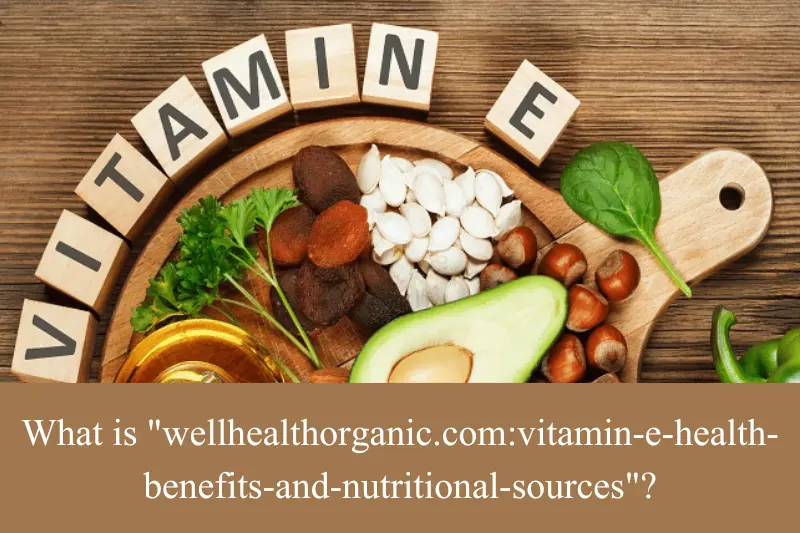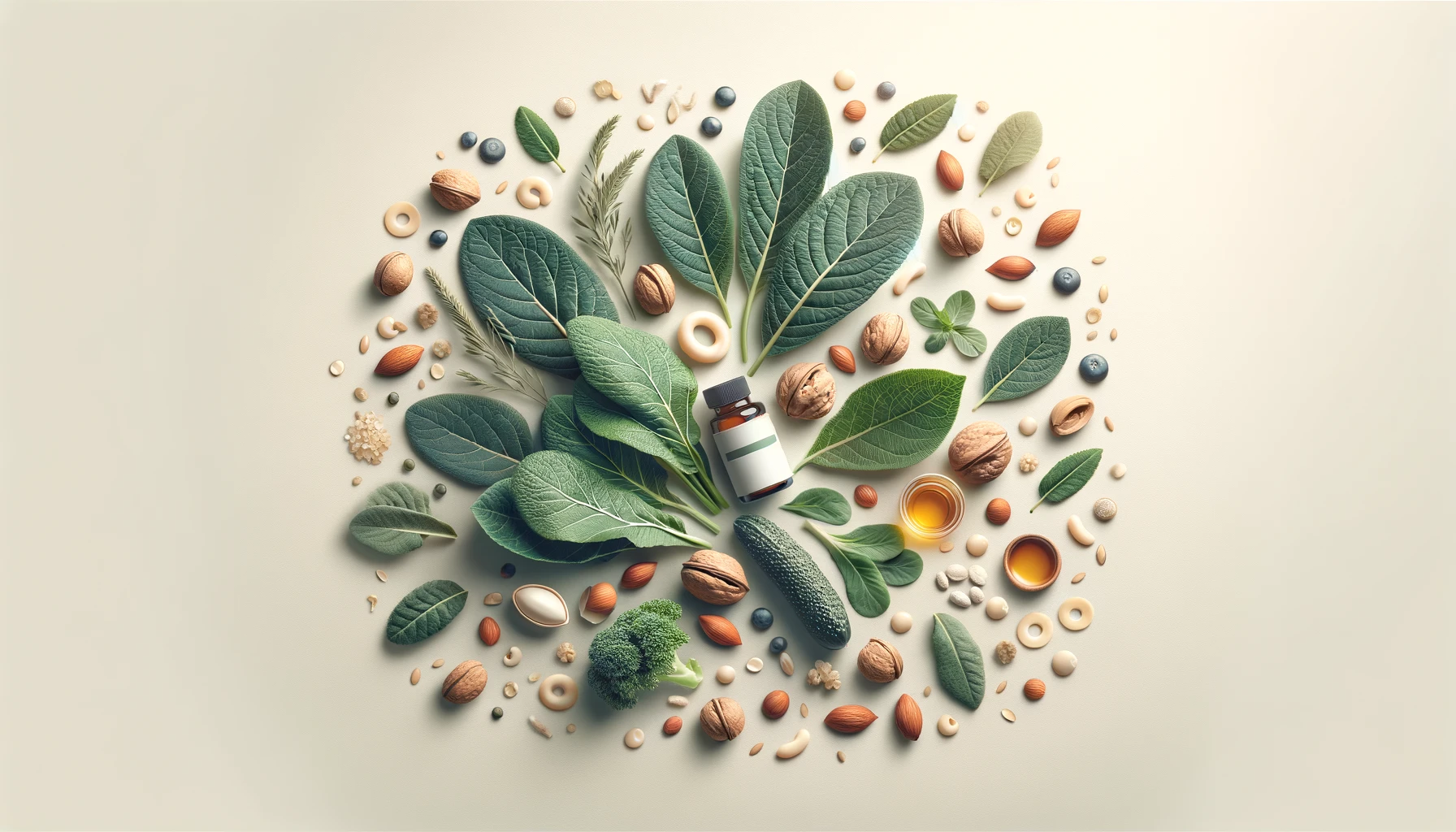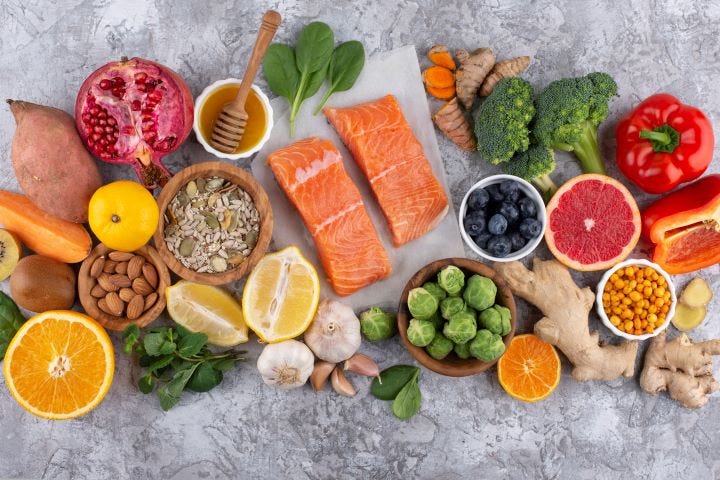Vitamin E stands as a vital nutrient, wielding potent antioxidant properties and offering an array of health benefits. From bolstering immune function to promoting skin health, its significance in maintaining overall well-being cannot be overstated. At Wellhealthorganic.Com, we embark on a journey to unravel the importance of Vitamin E, its manifold health advantages, and explore diverse nutritional sources for its incorporation into your dietary regimen.
Unveiling the Essence of Vitamin E
Understanding Vitamin E
Vitamin E, comprising a group of eight fat-soluble compounds, predominantly manifests in the form of alpha-tocopherol, acclaimed for its biological potency. Functioning as a robust antioxidant, Vitamin E serves as a shield against oxidative stress-induced cellular damage wrought by free radicals. Its indispensability spans across various bodily functions, encompassing immune fortification, skin rejuvenation, and cardiovascular sustenance.
Harnessing the Health Benefits of Vitamin E
1. Antioxidant Vigilance
Vitamin E emerges as a stalwart antioxidant, engaging in a ceaseless battle against free radicals to safeguard cellular integrity. This proactive stance aids in mitigating the risk of chronic ailments such as cancer, cardiovascular maladies, and age-related degenerative disorders.
2. Immune Fortification
The pivotal role of Vitamin E in fortifying immune function is underscored by its capacity to bolster immune cell activity and facilitate antibody production. Adequate intake of Vitamin E is deemed instrumental in fortifying the body’s defense against infections and fostering overall immune resilience.
3. Skin Revitalization
Renowned for its skin-revitalizing prowess, Vitamin E orchestrates a symphony of reparative actions. It serves as a bulwark against UV radiation, environmental assailants, and oxidative onslaught, nurturing skin resilience and fostering regeneration for a radiant visage.
4. Cardiovascular Guardianship
Vitamin E assumes the mantle of a cardiovascular guardian, orchestrating an array of protective mechanisms. By curbing the oxidation of LDL cholesterol, assuaging inflammation, and enhancing vascular function, it charts a course toward cardiovascular wellness, heralding reduced risk of heart ailments and bolstered cardiac vigor.
5. Anti-Inflammatory Sentinel
The anti-inflammatory prowess of Vitamin E emerges as a beacon of hope in combating inflammatory disorders. By taming inflammatory cascades, it assuages symptoms associated with conditions like arthritis, asthma, and inflammatory bowel maladies, paving the path toward alleviated discomfort and enhanced well-being.
Nourishing Nutritional Sources of Vitamin E
1. Nutritional Bounty of Nuts and Seeds
Nuts and seeds emerge as veritable treasure troves of Vitamin E. Almonds, sunflower seeds, hazelnuts, and peanuts stand as stalwarts in the realm of Vitamin E-rich fare. Integrating a smattering of nuts and seeds into your dietary repertoire can serve as a quintessential strategy for augmenting Vitamin E intake.
2. Embrace the Elixir of Vegetable Oils
Vegetable oils, wielding the mantle of Vitamin E reservoirs, offer an enticing avenue for fortifying dietary intake. Sunflower oil, safflower oil, and wheat germ oil stand as formidable contenders, extending their culinary allure as potent allies in the quest for Vitamin E sufficiency.
3. Verdant Vistas of Green Leafy Vegetables
The verdant expanse of green leafy vegetables unveils a cornucopia of nutrients, including Vitamin E. Spinach, kale, and Swiss chard grace the table as verdant ambassadors of Vitamin E abundance. Infusing these verdant marvels into salads, stir-fries, or smoothies can serve as a culinary coup d’état, heralding enhanced Vitamin E uptake.
4. Relish the Bounty of Fortified Foods
The proliferation of fortified foods presents a bounty of opportunities to augment Vitamin E intake. Breakfast cereals, fruit juices, and plant-based milk alternatives stand as vanguards of fortification, paving the path toward enhanced nutrient assimilation. A discerning eye toward nutrition labels can unlock a realm of fortified treasures, enriching your dietary landscape.
5. Embrace the Creamy Indulgence of Avocados
Avocados, revered for their creamy indulgence, emerge as stealthy purveyors of Vitamin E. Whether adorning sandwiches, salads, or smoothies, the velvety embrace of avocados offers a delectable means of enhancing Vitamin E assimilation, coupled with a gustatory extravaganza.
6. Delve into the Domain of Supplements
While the culinary landscape brims with an array of Vitamin E-rich fare, supplements stand as stalwart allies in fortifying dietary sufficiency. Particularly beneficial for individuals with specific dietary constraints or health exigencies, supplements offer a convenient conduit toward optimal Vitamin E intake. Consulting with a healthcare professional can offer valuable insights into supplement utilization, ensuring a judicious approach toward nutrient supplementation.
What is “wellhealthorganic.com:vitamin-e-health-benefits-and-nutritional-sources”?

“wellhealthorganic.com:vitamin-e-health-benefits-and-nutritional-sources” refers to a comprehensive guide that explores the various health benefits and nutritional sources of Vitamin E.
Essentially, it’s a resource that provides valuable information about how Vitamin E can positively impact your health and where you can find it in your diet.
Whether you’re curious about the benefits of Vitamin E or interested in incorporating it into your daily nutrition, this guide is here to help you understand all there is to know about this essential nutrient.
Why is “wellhealthorganic.com:vitamin-e-health-benefits-and-nutritional-sources” Important?
Essential Antioxidant Protection:
- Vitamin E is a potent antioxidant that helps protect your cells from damage caused by free radicals, thereby reducing the risk of chronic diseases like cancer and heart disease.
Skin Health and Beauty:
- Vitamin E plays a crucial role in maintaining healthy skin by promoting cell regeneration, moisturization, and protection against UV damage, resulting in youthful and radiant skin.
Immune System Support:
- By bolstering the immune system, Vitamin E helps your body defend against infections and illnesses, keeping you healthy and resilient year-round.
Heart Health Maintenance:
- Vitamin E contributes to heart health by preventing the oxidation of LDL cholesterol, reducing the risk of plaque buildup in arteries and lowering the chances of cardiovascular diseases.
Eye Health Enhancement:
- Studies suggest that Vitamin E may help prevent age-related macular degeneration and cataracts, promoting better vision and eye health as you age.
Brain Function Improvement:
- Vitamin E has been linked to improved cognitive function and reduced risk of cognitive decline in older adults, potentially delaying the onset of conditions like Alzheimer’s disease.
Reproductive Health Support:
- For both men and women, Vitamin E plays a role in fertility and reproductive health by protecting reproductive cells from oxidative damage and supporting hormone balance.
Muscle Recovery and Repair:
- Athletes and active individuals can benefit from Vitamin E’s ability to reduce exercise-induced oxidative stress, aiding in muscle recovery and repair after strenuous workouts.
Hair Growth and Strength:
- Vitamin E promotes healthy hair growth and strength by improving blood circulation to the scalp, nourishing hair follicles, and preventing oxidative stress that can lead to hair loss.
Essential Properties of Vitamin E
- Antioxidant: Neutralizes free radicals, preventing cell damage and oxidative stress.
- Strengthens the immune system: Contributes to the normal function of immune cells and protects against infections.
- Protects cardiovascular health: Reduces the risk of heart disease by decreasing the oxidation of LDL (“bad”) cholesterol.
- Maintains skin health: Promotes skin elasticity and hydration, delaying the appearance of wrinkles and signs of aging.
- Enhances eye health: Prevents age-related macular degeneration and cataracts.
- Cognitive function: Protects brain cells from oxidative damage and may help prevent neurodegenerative diseases like Alzheimer’s.
Subsection: The Different Forms of Vitamin E
There are several forms of vitamin E, with alpha-tocopherol being the most common and biologically active form in the human body. Other forms include beta-tocopherol, gamma-tocopherol, and delta-tocopherol, each with its unique properties and benefits. Understanding the different forms of vitamin E can help individuals make informed choices when it comes to supplementation or dietary intake.

Exploring the Various Health Benefits of Vitamin E
Vitamin E is a powerful antioxidant that plays a crucial role in maintaining good health. It helps protect cells from damage caused by free radicals, which can lead to chronic diseases such as heart disease and cancer. Additionally, vitamin E is known for its anti-inflammatory properties, which can help reduce the risk of conditions like arthritis and asthma. Furthermore, vitamin E has been linked to improved eye health, as it helps protect the cells in the eyes from oxidative stress.
Research has also shown that vitamin E may have benefits for brain health, as it can help prevent cognitive decline associated with aging. Some studies suggest that vitamin E may even aid in the prevention of conditions like Alzheimer’s disease. Moreover, vitamin E is essential for maintaining healthy skin and hair, as it helps protect against UV damage and promotes skin repair. With all these health benefits, it is clear that incorporating sufficient vitamin E into your diet is crucial for overall well-being.
Top Nutritional Sources of Vitamin E for a Balanced Diet
Vitamin E is a powerful antioxidant that plays a crucial role in maintaining good health. Including vitamin E-rich foods in your diet is essential for proper cell function and overall well-being. Some of the top nutritional sources of vitamin E include nuts, seeds, and green leafy vegetables.
Nuts and seeds like almonds, sunflower seeds, and hazelnuts are excellent sources of vitamin E. Incorporating these into your daily meals or snacks can help ensure you are meeting your daily vitamin E requirements. Additionally, green leafy vegetables such as spinach, kale, and broccoli are also rich in vitamin E and provide a host of other essential nutrients for optimal health.
Understanding the Role of Vitamin E in Boosting Immune System Function
Vitamin E plays a crucial role in supporting our immune system’s function. It is a powerful antioxidant that helps protect our cells from damage caused by free radicals, thereby enhancing our body’s defense mechanisms against infections and diseases. By neutralizing free radicals, vitamin E helps reduce inflammation and promotes the proper functioning of immune cells, such as T cells and B cells, which are essential for identifying and destroying harmful pathogens.
Furthermore, vitamin E has been shown to regulate the immune response by modulating cytokine production and signaling pathways. This can help the immune system differentiate between foreign invaders and healthy cells, preventing autoimmune reactions. Adequate levels of vitamin E in the body are essential for maintaining a robust immune system and overall wellbeing. To ensure optimal immune function, it is important to include vitamin E-rich foods in your daily diet or consider supplementation under the guidance of a healthcare provider.
How Vitamin E Supports Skin Health and Anti-Aging Properties
Benefits of Vitamin E for Skin Health
Vitamin E is a powerful antioxidant that plays a crucial role in maintaining healthy skin. It helps protect the skin from damage caused by free radicals, environmental factors, and UV rays. Vitamin E also supports the skin’s natural healing process, making it effective in treating scars, burns, and skin conditions such as eczema and psoriasis.
Anti-Aging Properties of Vitamin E
Regular consumption of vitamin E can help slow down the aging process and reduce the appearance of wrinkles and fine lines. By neutralizing free radicals, vitamin E helps prevent oxidative stress, which is a major contributor to premature aging. Additionally, vitamin E promotes collagen production, improving skin elasticity and firmness for a more youthful appearance.
Incorporating Vitamin E into Your Daily Wellness Routine
Section 6 focuses on the practical aspects of integrating Vitamin E into your daily routine to promote overall wellbeing. By incorporating this essential nutrient into your daily regimen, you can experience a multitude of health benefits, from supporting immune system function to promoting skin health and anti-aging properties. Including a variety of Vitamin E-rich foods in your diet, such as nuts, seeds, and leafy greens, can help ensure you are meeting your daily recommended intake.
Conclusion: Embracing the Essence of Vitamin E
Vitamin E epitomizes a quintessential ally in the pursuit of holistic well-being, wielding its antioxidant prowess and fostering a tapestry of health benefits. By embracing an array of Vitamin E-rich nutritional sources, including nuts, seeds, vegetable oils, green leafy vegetables, and avocados, you embark on a transformative journey toward optimal health and vitality. At Wellhealthorganic.Com, we extol the virtues of Vitamin E, advocating for its integration into your dietary canvas to unlock a realm of health and wellness.

